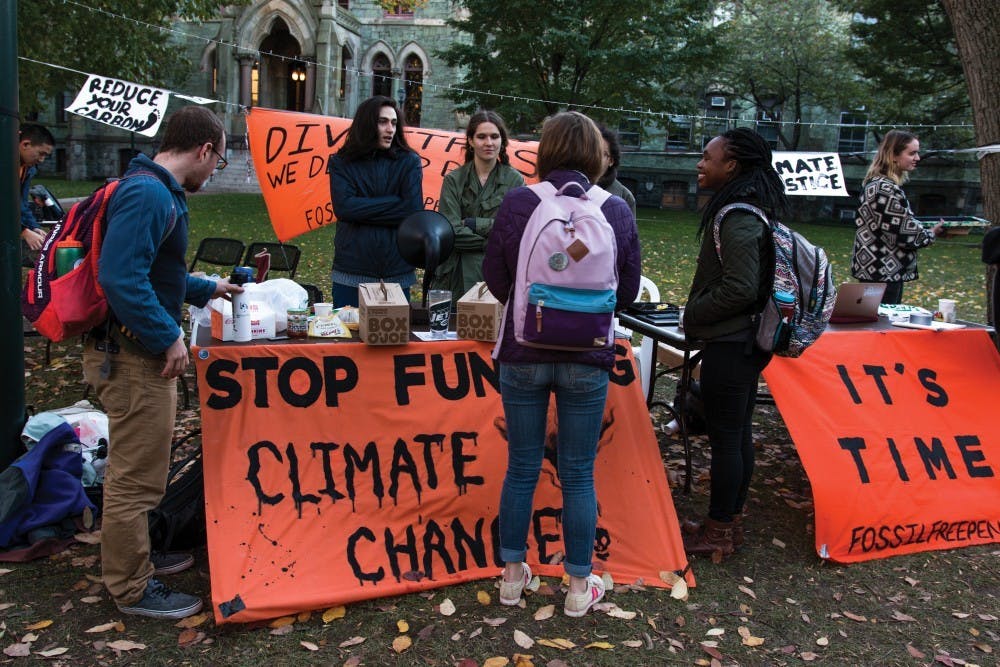
Three years after its founding, Fossil Free Penn has solidified itself as a campus organization pushing for University divestment from fossil fuels. But despite a diversified array of efforts to sway the administration, Penn has not budged since FFP's launch in 2014.
Multiple protests, rallies, and outreach efforts with administrators have not produced tangible University policy changes. But group members seem to remain optimistic about FFP's future, and many said this is because of the club's change in strategy this semester. Earlier this semester, FFP established that they are focusing more on reaching students and individual members of the Board of Trustees.
“The protests weren’t as large and impactful as we wanted them to be, so what we’re trying to do is rebrand,” said College sophomore Jacob Hershman, FFP outreach coordinator. “We believe [waiting to plan another protest] is the most appropriate and successful way of achieving what we want with the divestment movement.”
FFP has reached some recent qualitative success. This semester, attendance at their weekly meetings has increased by 50 percent, and it has garnered the support of on-campus groups such as Table Talk and the United Minorities Council.
In upcoming semesters, FFP plans on channeling alumni to the divestment cause.
FFP Faculty and Alumni Coordinator and College junior Amy Goldfischer said she is working on a project in collaboration with alumni to create a fund for FFP. That fund would be donated to Penn if Penn decides to divest from fossil fuels. Failure to divest by a certain date would send the funds to the FFP campaign.
“It’s not an overnight process, so we focus on building bases of support,” Goldfischer said. “I think this semester has definitely had a lot of progress.”
FFP was founded in 2014 after the People’s Climate March in New York City with the goal of Penn divesting all money from fossil fuels — an action that can only be taken by Penn’s Board of Trustees, chaired by Senior Executive Vice President of Comcast David Cohen.
In February last year, the group created a University-wide referendum to see campus’ opinion on divestment. Thirty-three percent of the undergraduate students voted, of which 87.8 percent favored divestment. In November of 2015, the Ad Hoc Advisory Committee on Divestment was established and it ultimately ended in a September 2016 decision not to divest from fossil fuels.
The decision prompted a series of actions from the group, including a February 2017 demonstration at a University Council forum and the November 2016 and March 2017 sit-ins in College Hall that resulted in the Office of Student Conduct citing 13 students.
After another rejection of its open letter to the University in June, FFP officially decided to rebrand. The group began the semester with a rally and reached out to the Board of Trustees again. Despite Cohen's reiteration of the University's decision, FFP members have continued to protest at Board of Trustees meetings and focus on expanding the group's membership.
"I would definitely call this semester successful, at the very least we expanded our circles,” FFP Campaign Co-Coordinator and College junior Zach Rissman said, adding that attending the Trustees meetings allowed students to become more “motivated” after witnessing the “scripted” nature of how Penn operates.
FFP Co-Coordinator and College sophomore Claudia Silver said she became involved after attending the 200-person sit-in at College Hall in March this year. However, she said she does not expect large sit-ins in the future — at least until FFP is confident that they will be more effective.
“We’re not trying to repeat the same tactics we’ve done before,” Silver said. “We have the same goal of divestment but we’ve tried to come up with new ways to come about it.”
The Daily Pennsylvanian is an independent, student-run newspaper. Please consider making a donation to support the coverage that shapes the University. Your generosity ensures a future of strong journalism at Penn.
Donate



